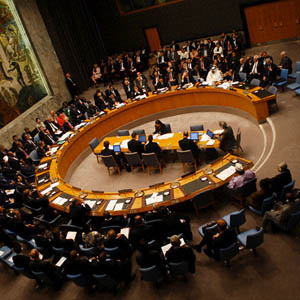A Resolution and Some Questions
Why doesn’t Elbaradei’s report stop adoption of further sanctions against Iran

Libya, South Africa, Indonesia, and Vietnam are a group of non-permanent members of UNSC that have asked for a postponement in proposition of the third draft resolution until Elbaradei presents his report on Iran’s nuclear activities.
Elbaradei has presented this report but although Iran’s cooperation with IAEA has been confirmed, he also has mentioned that uranium enrichment is still pursued by Iran. Addressing this cooperation made some Iranian officials and political observers to view the report positively. However, according to foreign analysts addressing ‘continuation of enrichment by Iran’ in this report is important and may become a motive for exerting new pressure on Iran.
According to their analyses, Tehran’s cooperation with IAEA is not important for France, Britain, and the United States as the main supporters of approving new sanctions against Iran, and what counts for them is that Iran keeps ignoring previous resolutions. Approving new resolutions by the Security Council against Iran in case of not stopping uranium enrichment was mentioned in the previous resolutions.
But a question raised by non-permanent members of Security Council after Elbaradei’s report is that while Iran is cooperating with IAEA –although it hasn’t stopped uranium enrichment- is it necessary to pass another resolution? This hadn’t occurred during approval of previous resolutions and they were passed unanimously.
After postponement of vote on the third resolution against Iran until Monday, some diplomats in United Nations Security Council claimed that the consent of these members will also be gained in the upcoming days. However, even if they disagree with carrying another resolution against Iran, there are still enough votes to pass the resolution.
But Britain and France are still trying for a unanimous resolution just as the previous cases. John Savors, the British ambassador to UN, has remarked that the more support the new resolution gains, the more it conveys a political message for Iran.
Still there’s the question that to what extent do doubts of these four countries to follow UNSC permanent members hamper efforts to pass the resolution?
News released by some diplomats during the previous days had it that attempts were made to pass a resolution on Iran last Monday in IAEA’s Board of Governors. Referring to this news, AFP stated that it’ll be an unordinary measure. It’ll be for the first time in two years that such a resolution may be approved, a sign that IAEA has lost its patience for the Islamic Republic. Some diplomats have mentioned that this likely resolution can be a step towards retaking the control of Iran’s nuclear issue from Security Council.
However, diplomats emphasized that still no decision has been taken on this possible resolution in the Board of Governors and probably they are waiting for events of the Security Council. Hence, the ball is in New York’s court and it is unlikely that a resolution gets approved in IAEA’s Board of Governors.
According to the new draft resolution, 90 days after it is passed, Elbaradei will present another report on Iran’s nuclear activities. To whatever it refers, this report inevitably has to answer a fundamental question, one that will become basis for UNSC members’ measure: has Iran halted uranium enrichment? Or it’s still continuing the practice?

